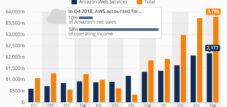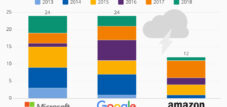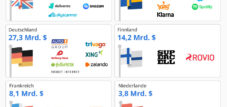The digital dependence on the USA: cloud dominance, distorted trading balance sheets and lock-in effects
Xpert pre-release
Language selection 📢
Published on: April 10, 2025 / update from: April 10, 2025 - Author: Konrad Wolfenstein

The digital dependence on the USA: cloud dominance, distorted trade balance sheets and lock-in effects-Image: Xpert.digital
Europe's digital sovereignty: between dependency and global challenges
US cloud dominance: How Europe can free itself from digital dependency
Europe faces a profound digital challenge that includes both economic and security policy dimensions. American cloud providers dominate the European market to an extent that raises questions about digital sovereignty, while the real economic interdependencies in trade balance are not adequately mapped. At the same time, European companies and institutions see themselves in an increasingly difficult dependency situation through subtle lock-in mechanisms, from which an outbreak appears to be economically barely presentable.
Suitable for:
- Trusty AI: Europe's trump card and the chance of taking on a leading role in artificial intelligence
The market power of American cloud providers in Europe
The dominance of American tech companies on the European cloud market has achieved worrying proportions. Current data show that US providers control an overwhelming share of the European cloud market. “With over 70 percent market share, Amazon, Microsoft and Google control the European cloud market”, as can be seen from an analysis of 2025. This concentration exceeds far earlier forecasts from the ECO association of the Internet economy, which predicted in 2016 that "over 80 percent of the world's traffic centers between data centers would come out of the cloud before 2020".
The dependency continues to grow, as a current Bitkom study from 2024 shows: “A total of 81 percent of companies in Germany use cloud computing, another 14 percent are planning this or discuss it, for just 5 percent the cloud is not an issue.” The dynamic of growth is particularly remarkable: "Currently, companies operate around a third (38 percent) of IT applications from the cloud. In five years, the proportion is said to have increased to 54 percent." This development continues the dominant position of the US providers.
The supremacy of American cloud providers can be attributed to several factors. On the one hand, they offer a comprehensive portfolio of services that European providers do not reach width and depth. On the other hand, you benefit from network effects that arise from your globally available platforms. The massive market share enables you to use scale advantages and design prices with which local providers can often not compete.
The consequences of US dominance for Europe
This dependence carries considerable risks for the European economy and society. The stored data is potentially subject to US legislation, which could endanger the protection of sensitive European data. “The 'US Cloud Act' obliges American providers to issue data on the official request - regardless of the location,” warns an analysis from 2025.
The data protection authorities in Europe are already alarm. Both the Norwegian and the Danish data protection authority have given 2025 clear warnings: "Companies should prepare a strategy on how to deal with American cloud services if the data transfer to the USA is suddenly no longer permitted." These warnings reflect on the increasing concern of the legal uncertainty in the use of American cloud services.
Suitable for:
- Unequal trade balance USA-EU? Digital US services are missing-Revaluation of transatlantic trade is necessary!
The distorted look at the trade balance between the EU and the USA
The official trade statistics between the EU and the USA present an incomplete picture of economic reality. While a US trade deficit is often reported to the EU in the media, a crucial factor is often not taken into account: the enormous sales that US technology companies generate in Europe without it fully appearing in the commercial balance sheet.
The invisible digital trade currents
A detailed analysis of the year 2025 illustrates this problem: "The central thesis of this investigation is that the official trade statistics may draw a distorted image of the actual economic interdependencies between the USA and the EU. This is primarily due to the way income is booked from digital services." The core problem: "Many US technology giants generate considerable sales in Europe, but these profits are often booked through subsidiaries in countries such as Ireland and Luxembourg."
This booking practice means that "a significant part of these income in bilateral trade statistics is not shown as direct US exports in the EU." Specifically, this means: "When European consumers or companies use services from these US technology companies (e.g. Google Ads, Amazon Web Services, Meta ADS), invoicing is often carried out via the Irish or Luxembourg subsidiary."
The actual trade balance taking into account digital services
According to the official statistics, the United States has "had more goods and services for the equivalent of just under 1,000 billion euros (one trillion euro) than executed." In the first three quarters in 2024, "the US current account compared to the European Union was negative at just under 130 billion euros, of which 75 billion euros are made on Germany alone."
However, these numbers do not fully take into account the extensive income from digital services. "If these income were fully recorded as US service exports into the EU, the service trade balance would be shifted significantly. It is conceivable that the current US surplus would pass into a deficit or at least decrease significantly." This indicates that “the fact that the actual economic relationship is more balanced or even has a slight overweight in favor of the United States if you take into account the entire scope of digital services.”
Suitable for:
🎯🎯🎯 Benefit from Xpert.Digital's extensive, fivefold expertise in a comprehensive service package | R&D, XR, PR & SEM

AI & XR 3D Rendering Machine: Fivefold expertise from Xpert.Digital in a comprehensive service package, R&D XR, PR & SEM - Image: Xpert.Digital
Xpert.Digital has in-depth knowledge of various industries. This allows us to develop tailor-made strategies that are tailored precisely to the requirements and challenges of your specific market segment. By continually analyzing market trends and following industry developments, we can act with foresight and offer innovative solutions. Through the combination of experience and knowledge, we generate added value and give our customers a decisive competitive advantage.
More about it here:
European cloud projects: key to digital independence
The lock-in effect: the subtle captivity in the cloud
A particularly problematic dimension of cloud dependency is the so-called lock-in effect, also called the binding effect. This mechanism binds customers to a certain provider in the long term by making switching to alternative providers technically complicated and economically unattractive.
Mechanisms of the lock-in effect
"Vendor Lock-In Effect means that customers are dependent on the products and services of a provider. This is achieved by working very well together in the company's own ecosystem." The providers deliberately shape their systems in such a way that they work perfectly internally, but are not compatible with products from other manufacturers.
This strategy means that "the change to another provider is complex and expensive." This problem is particularly pronounced in the cloud area: "With Cloud Services, the change of provider is often particularly difficult. This is because the systems are not compatible with each other because no open standards are used."
Suitable for:
Economic consequences of the lock-in effect
The economic consequences of the lock-in effect are serious. Companies and organizations "go into a direct dependency and thus get into a poor negotiating position. For example, if providers drastically increase prices or reduce the quality of their offers, customers are forced to tolerate this."
The situation with critical systems is particularly problematic: "If systems fail, companies may not offer their service because they rely on all the providers' programs." This dependence can take on existence -threatening proportions and further increases the market power of the dominant providers.
Technological dependencies "lead to considerable change costs and additional barriers at the company level, known as the lock-in effect. If a company or an organization no longer has the opportunity to switch between different technical solutions, its freedom of choice and action is severely restricted, which in turn influences digital sovereignty negatively."
Suitable for:
European approaches to digital sovereignty
In view of the growing dependence on US cloud services, Europe develops strategies to strengthen its digital sovereignty. These efforts aim to create alternatives to the dominant US providers and to regain control of European data.
Gaia-X and 8ra: European cloud initiatives
A central European project is Gaia-X, which aims to create a European cloud infrastructure based on European values such as data protection, transparency and openness. "With the Cloud project GAIA X on the table for a long time, but the Coronavirus crisis and the telephone applications required show how great the dependency on US providers is still."
Another promising project is the EU project “8ra”, which promises “a breakthrough”: “A cloud edge continuum based on open standards for Europe's digital sovereignty.” This project aims to create a real alternative to the US providers and to strengthen the digital sovereignty of Europe.
Growing demand for European alternatives
Interest in European alternatives to US cloud services is growing rapidly. “The website 'European Alternatives' website recorded an increase in visitors from 26,000 to 611,000 within three months.” European providers report significantly increased demand: "In advance, we had written on a number of European providers to this video that offer alternatives to US digital products and really all those who answered said, definitely, have increased significantly since the Trump-Ammung."
Suitable for:
- Gaia-X: Data security & interoperability between different systems and actors in the Smart Factory & Industrial Metaverse
Strategies to reduce dependency
In order to reduce the dependence on US cloud providers, various strategies are discussed and implemented:
- Multi-cloud strategy: "You can also rely on a multi-cloud or hybrid cloud strategy during cloud computing. In the multi-cloud strategy, you secure your data from various cloud providers, which means that you do not depend on a single one."
- Federated Clouds: "Digital sovereignty is therefore essential for Dyroff to abolish the infamous 'Lock-in Effect', i.e. to make services regardless of individual providers. Open standards for interfaces and open source code are crucial for this, for example with 'Federated Clouds' or Interoperable Messenger services, the 'full access' to manufacture on all components and the 'full transparency'. ”
- 3. Local data posture: "The Hybrid Cloud strategy stipulates that part of your data is stored in direct control in your private cloud or locally and the other part is secured in an external cloud."
The importance of the ICT industry for Germany
Information and communication technology (ICT) plays an increasingly important role for the German economy. According to the ICT industry picture in 2023, this sector grows continuously and contributes significantly to the economic development of Germany.
Economic key figures in the ICT industry
The sales of the ICT industry "also develops positively in 2022, grows by almost 12 percent and climbs to a new high of almost 315 billion euros." Of this, more than two thirds of the sales within the ICT industry are omitted to the ICT service providers, the remaining almost 31 percent generate the hardware manufacturers. ”
The high investment volume of the industry is particularly noteworthy: "The ICT industry is investing a good 20,000 euros per person who is about the previous year. This underlines the future -oriented orientation of the sector.
However, the ICT industry is not only economically significant, but also strategically important for the digital sovereignty of Germany. A strong domestic ICT industry could help reduce the dependency on foreign providers.
Future prospects and recommendations for action
The digital dependence on US cloud providers is a complex challenge that requires determined action at different levels. Various measures are necessary to strengthen digital sovereignty and correct economic distortions.
Create transparency in the trade balance
A realistic assessment of trade relationships between the EU and the USA requires improved recording digital services in the trade balance sheets. "It is essential to continue the efforts to improve the measurement of digital trade in international statistics. The development of new statistical framework works that can better capture the value and the flow of digital services is of crucial importance."
Promotion of European cloud providers
The support of European cloud providers is essential to create alternatives to US services. This includes both financial support and regulatory measures that ensure fair competitive conditions. "Powerful European cloud and AI companies as well as technologies are missing in order to operate data and applications independently and confidently."
Strengthening open standards and interoperability
In order to reduce lock-in effects, open standards and interoperability must be encouraged. “Open standards for interfaces and open source code” are crucial to “make services regardless of individual providers.” This enables customers to switch between different providers without causing prohibitive costs.
Data control and innovation: Europe's struggle for digital freedom
The digital dependence on US cloud providers is a complex problem with economic, security policy and geopolitical dimensions. The distorted representation in trade balance sheets obscures the true extent of the economic interdependencies, while lock-in-effects keep European companies and institutions in a problematic dependency.
The strengthening of the digital sovereignty of Europe requires a coordinated approach - from the creation of alternative infrastructures to the promotion of open standards to the development of a more realistic image of economic relationships between Europe and the USA. This is the only way to make Europe its digital future self -determined and regain control of its data.
The current initiatives such as Gaia-X and 8RA as well as the growing interest in European alternatives to US services are encouraging steps in the right direction. However, they must be accompanied by determined political action and long -term investments in the European technology landscape in order to make sustainable changes.
We are there for you - advice - planning - implementation - project management
☑️ SME support in strategy, consulting, planning and implementation
☑️ Creation or realignment of the digital strategy and digitalization
☑️ Expansion and optimization of international sales processes
☑️ Global & Digital B2B trading platforms
☑️ Pioneer Business Development
I would be happy to serve as your personal advisor.
You can contact me by filling out the contact form below or simply call me on +49 89 89 674 804 (Munich) .
I'm looking forward to our joint project.
Xpert.Digital - Konrad Wolfenstein
Xpert.Digital is a hub for industry with a focus on digitalization, mechanical engineering, logistics/intralogistics and photovoltaics.
With our 360° business development solution, we support well-known companies from new business to after sales.
Market intelligence, smarketing, marketing automation, content development, PR, mail campaigns, personalized social media and lead nurturing are part of our digital tools.
You can find out more at: www.xpert.digital - www.xpert.solar - www.xpert.plus
































